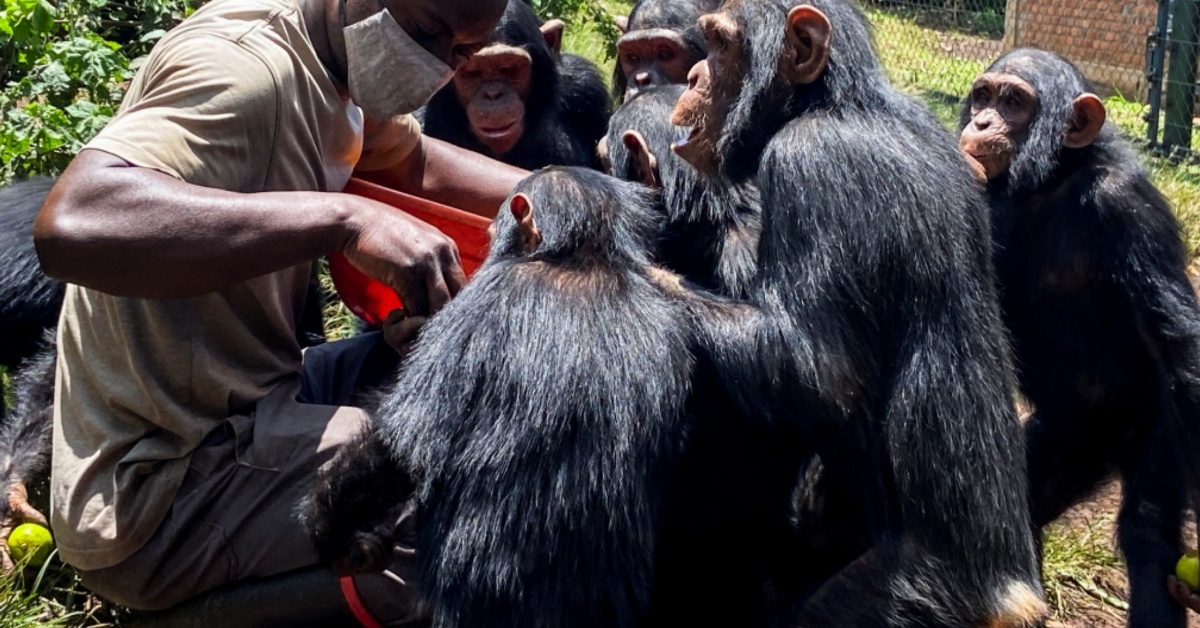Thirty-one chimpanzees, led by one named Bruno, an enormous alpha male and uncontested ruler of the sanctuary, escaped the Tacugama Chimpanzee Sanctuary in April 2006 and vanished into the bush.
Bruno’s current whereabouts are a mystery – may be presumed dead. Parts of Freetown were gripped by fear. It was perhaps the first time that most Sierra Leoneans heard about Tacugama and the fact that a sanctuary existed there for chimpanzees.
Even today, most do not realize the importance of the western chimpanzee, the species of the ape found in most countries that host the Upper Guinea forest, including Senegal, Guinea, Sierra Leone, Liberia and Côte d’Ivoire.
In 2016, the International Union for Conservation of Nature (IUCN), the global organization with the world’s most comprehensive information source on the global conservation status of animal, fungi and plant species, assessed the conservation status of the Western chimpanzee as critically endangered, while the common chimpanzee species as a whole carries an endangered status.
The IUCN says widespread deforestation is the biggest threat to this primate’s survival. It says oil palm plantations threaten 94% of the chimpanzee habitat in Liberia and 84% in Sierra Leone. These two countries, along with Guinea, are considered the remaining strongholds of the western chimpanzee.
In addition, western chimpanzees are subject to trafficking, bush meat poaching, and indirect involvement in the hunting of other species such as antelope. Because of the close proximity of many chimpanzee populations to human settlements and their remarkable genetic similarity to humans, there’s a high risk of chimpanzees catching diseases like Ebola that could prove fatal.
There are now just 50,000 western chimpanzees left, dropping nearly 80% over the past few decades. If immediate action is not taken, they face an impending threat of extinction. Since 1995, the Tacugama Chimpanzee Sanctuary (TCS) has done an outstanding job of safeguarding the western chimpanzee and other wildlife in Sierra Leone. They have received little support from Governments who continue to sell forest reserves and allow logging of our valuable forests.
Last week, they received a big boost with the news that our national animal, the chimpanzee, is printed on the new passport of Sierra Leone. Tacugama tweeted appreciation to the Ministry of Internal Affairs, the Immigration Department and the Ministry of Tourism for their support.
However, with little sensitization, many Sierra Leoneans were critical of the move. A comment on Facebook stated,
“This is Sierra Leone new Passport book. Thank God to those that have option.” Another wrote:
“This’s not a joke, it’s actually the new Sierra Leone passport, yes the new one, some wise guys thought babu face is the best image for put pan passport…an image commonly associated with sarcasm (babu yie) in Sierra Leone.
An image globally used to discriminate against blacks & refer to them as apes, for any subor African government to then place such image on our national passport during these trying times speaks volumes about then knowledge and empathy of the Bio government towards the unbearable suffering of citizens.
Babu face on passport where tourism is literally nonexistent and endangered animals such as elephants and leopards are killed on sight while government remains mute.
This must be the first of its kind in the world.” One sarcastically noted that “Whilst we at it let’s make banana the national fruit.”
The comments and concerns are not unexpected and more could have been done to sensitize the general citizenry about the move before the passport was released.
There is also an urgent need to educate citizens about the importance of the western chimpanzee. Additionally, the printing of the chimpanzees on the passport could have been of a much higher quality.
They are our close relatives and play a vital role in maintaining the diversity of our forests. The large seeds they eat and disperse are too big for most other animals.
Without them and their fellow great apes and elephants, these forests would be irreversibly changed.
They share more than 98% of their DNA with humans and many of the same activities, such as using tools for hunting and plants for medicinal purposes and even rocks to play sports.
This critically endangered species is mankind’s closest relative. As such, we have a great deal in common between our species. Chimpanzees are robust apes covered in thin black hair, except for their faces, hands, and feet, which are bare.
This bare skin is pink on newborns, but turns black as they get older.
Like humans, chimpanzees may go partially bald later in life and develop gray hair, particularly around their chin.
According to Rakiatu Jalloh of the Patriotic Advocacy Network (PAN) in a poem on Tacugama’s website, they “are now our biggest treasure.”
Mountain gorilla tourism is driving economic growth and conservation in Rwanda. Namibia’s well-developed game and trophy hunting is one of the largest foreign exchange-earning industries. It could do the same if we tapped it well in Sierra Leone.
Already Tacugama is one of the few stops for tourists in Sierra Leone. Let us give it the required support. We should not be embarrassed by them or comments that will be made by ignorant immigration officers.
If they do not know about the chimpanzees, our passport now gives us an excellent opportunity to educate them.
It is a perfect opportunity to raise global awareness. Instead of being known for war and Ebola, we might become renowned for our efforts to save the western chimpanzee and preserve the ecosystem.
Government must demonstrate that its commitment to rescue the chimpanzees is genuine and not just tokenism.
Let us ignore our fears about the perceived stereotype and help save the western chimpanzee.
Let us stop killing them indiscriminately and destroying the forests they live in. Maybe then we will have no reasons to keep them on our passports.




 Post a comment
Post a comment









